Browse Topics
Categories
Format
Multimedia
Speakers Series
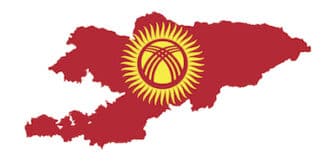
Kyrgyz Post-Soviet Foreign Policy: A Habit of Dependency
Emilbek Dzhuraev, OSCE Academy in Bishkek, Kyrgyzstan [doc id=5684]
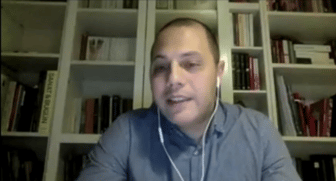
Youth, Peace and Security Nexus: Perceptions Toward Youth
From global climate change demonstrations and strikes to protests against ruling elites, corruption, and inequality, the world witnessed mass youth protests in the last year. Despite youth’s remarkable political mobilization, their messages are often devalued or ignored. This is mainly related with the contradictory perceptions of youth as being ‘troublemakers’ or ‘victims’, or ‘agents of […]
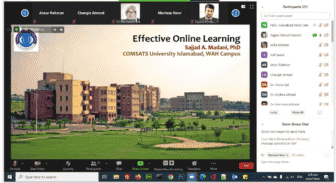
International Virtual Master Trainers Workshop
In the spring of 2020, colleges and universities around the globe experienced sudden disruption from the onset of the COVID-19 pandemic. What followed could be considered the first global crisis in higher education, with over 200 million enrolled students experiencing unplanned shifts to remote learning, while instructors, administrators, and officials were forced to execute quickly […]

رسم تخطيطي لمشهد الإعلام الجديد
بعد أن تغلغل الإنترنت والتقنيات الرقمية في حياتنا اليومية، شهدت الطرق التي نتلقى من خلالها المعلومات- أكانت أخبارًا أو بيانات مرتبطة بما يحيط بنا أو معلومات تجارية أو مجرد تواصل شخصي- تحولًا كبيرًا. فقد أدّى ظهور منصات التواصل الاجتماعي إلى تغيّر جذري في كيفية استهلاكنا للمعلومات والأخبار حول العالم، بغض النظر ما إذا كان ذلك للأفضل أم للأسوأ. وفي المقابل، فإن الأساليب الجديدة التي يتم من خلالها جمع الأخبار والمعلومات - شأن المدونات المكتوبة (blogs) والمدونات المرئية (vlogs) والمدونات المسموعة (podcasts) وغيرها- قد أوجدت مسارات بديلة تتيح حرية التعبير في البيئات التي بات فيها مشهد وسائل الإعلام التقليدية يخضع أكثر فأكثر للانتقائية أو الرقابة أو حتى القمع. فقد بدأ المواطنون باستخدام أجهزتهم الشخصية لنشر المعلومات وتنظيمها؛ ليصبح الترابط عبر وسائل التواصل الاجتماعي وسيلة للتعبئة. إلا أنّ هذه المسارات الجديدة أظهرت أيضًا أنّ المعلومات تنتشر بسرعة كبيرة ومن دون قيود. فأصبحت المعلومات المضللة أداة قوية تستخدمها الجهات الحكومية وغير الحكومية، والكيانات العامة والخاصة على حد سواء.

Yeni Medya Topografyası
Bilgi edinme biçimlerimiz, – ister haber, ister çevremizle ilgili veri, ticari bilgi veya sadece kişisel iletişim olsun – internetin ve dijital teknolojilerin hayatımıza nüfuz etmesiyle büyük bir değişime uğradı. Sosyal medya platformlarının popülerleşmesi tüm dünyadan gelen bilgiyi ve haberleri tüketim biçimimizi iyisiyle kötüsüyle kökten değiştirdi. Öte yandan haberi ve bilgiyi sunmak için kullanılan bloglar, video […]
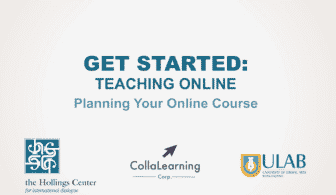
Get Started: A Video Series for Educators Preparing to Teach Online
For over twenty years early adopters of eLearning spent time and energy trying to convince administrators, quality standards committees, funding agencies, and academic staff of the merits of digital education and the necessity of the education industry to pioneer new approaches to teaching and learning to meet the needs of learners in the 21st century. […]
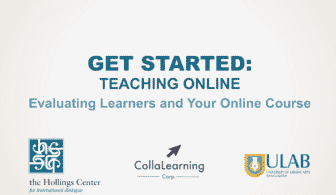
Get Started: Teaching Online #4 - Evaluating Learners and Your Online Course
How can online courses and the students that take them be effectively evaluated? This video discusses the methodologies that can be used in figuring out what worked and what did not when conducting online courses. The COVID-19 pandemic has resulted in schools around the world making transitions from in-person to online learning. Get Started: Teaching […]
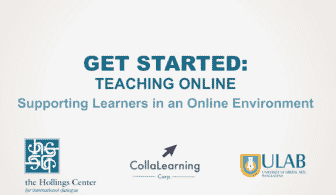
Get Started: Teaching Online #3 - Supporting Learners in an Online Environment
What services, structure, and expectations are needed for successful online learning? How can learning experience be more enjoyable while still attaining positive learning outcomes? The COVID-19 pandemic has resulted in schools around the world making transitions from in-person to online learning. Get Started: Teaching Online is four-part series of videos designed to highlight new learning […]
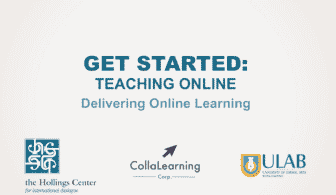
Get Started: Teaching Online #2 - Delivering Online Learning
How can online education be effectively delivered? How can you choose the best delivery method based on the needs of your students? This video outlines some of the differences between synchronous and asynchronous learning methods in online education. The COVID-19 pandemic has resulted in schools around the world making transitions from in-person to online learning. […]

Get Started: Teaching Online #1 - Planning Your Online Course
How do you identify the learning outcomes of your online course? What are the best methods for identifying, sourcing, and organizing content for online instruction? How is this important to ensuring your course is engaging and effective? The COVID-19 pandemic has resulted in schools around the world making transitions from in-person to online learning. Get […]
A non-profit, non-governmental organization dedicated to fostering dialogue between the United States and countries with predominantly Muslim populations in the Middle East, North Africa, South Asia, Eurasia and Europe
Stay Informed
Subscribe to our mailing list to stay up to date on our latest information.